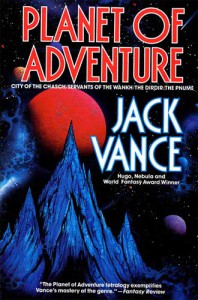Still Reading Vance
 In the past I’ve usually read Jack Vance in short spurts, but this time I’ve been on a huge binge and am still enjoying the prose. The whole exploration (and re-discovery in the case of Planet of Adventure) was unfortunately sparked by the author’s death.
In the past I’ve usually read Jack Vance in short spurts, but this time I’ve been on a huge binge and am still enjoying the prose. The whole exploration (and re-discovery in the case of Planet of Adventure) was unfortunately sparked by the author’s death.
I’ve just closed the last page on The Planet of Adventure omnibus and I found it just as difficult to set down as I had the first time, which really says something. It has all the usual Vancian touches: fascinating cultures, religions, and philosophies, not to mention truly alien aliens. Protagonist Adam Reith isn’t that different from Vance’s other non-satirical protagonists (like Kirth Gersen, say) but his straightforward outlook and intelligence remain refreshing, not to mention his sense of decency, his bravery, and his loyalty to friends. And speaking of friends, one of the things I like about this sequence is that there is a cast of loyal companions. Vance’s protagonists are usually lone wanderers. There’s plenty of wandering on the planet Tschai, but Reith is usually with at least one of his friends.
Interestingly, I can’t believe I never noticed this before, but it is becoming more and more clear to me that Vance had a huge impact on the first big science fiction game, Traveller. Reith is a planetary Scout, and is a jack-of-all-trades and survival expert, just like the characters in Traveller‘s Imperial Scout service. There are Traveller’s aid hostels in the Alastor books, not to mention air rafts and, perhaps more importantly there’s the general feel of independent planets in a sector but a unified sector government. In Vance, as with Traveller, every planet is a potential adventure setting. Vance, then, was a huge influence not just on D&D (the fire and forget spells, the hand and eye of Vecna) but upon Traveller‘s default setting.
These books, being written for the most part back in the late ’60s and early ’70s, are still pretty male-centric. It’s not that women in the stories aren’t intelligent, but they’re almost never the focus of the story and don’t usually have much interaction with the main character unless there’s a love interest. I suppose that’s due to the reader base at the time, which would have been primarily male, not to mention the American culture of the period. It’s really the only dated aspect to be found, for Vance was otherwise quite farseeing. I hope this won’t damn him for future readers. It is too much to expect even a genius to completely transcend the time in which he was writing. (Assuming people will still be reading anything of mine in 40 years, I wonder what things I’ll have done that will make my work dated? Hope I’m still alive to hear about it…)
Speaking of great fiction, my son’s now back to reading the first Chronicles of Amber (Zelazny, not Vance) and is up to book 3, Sign of the Unicorn. He loves it, and it’s a real pleasure to see him astonished by the various surprises and plot turns. I think I was about his age when I read the books for the first time, and I don’t think there is any other work I’ve read as many times, even including the stories of Harold Lamb.
0 Comments